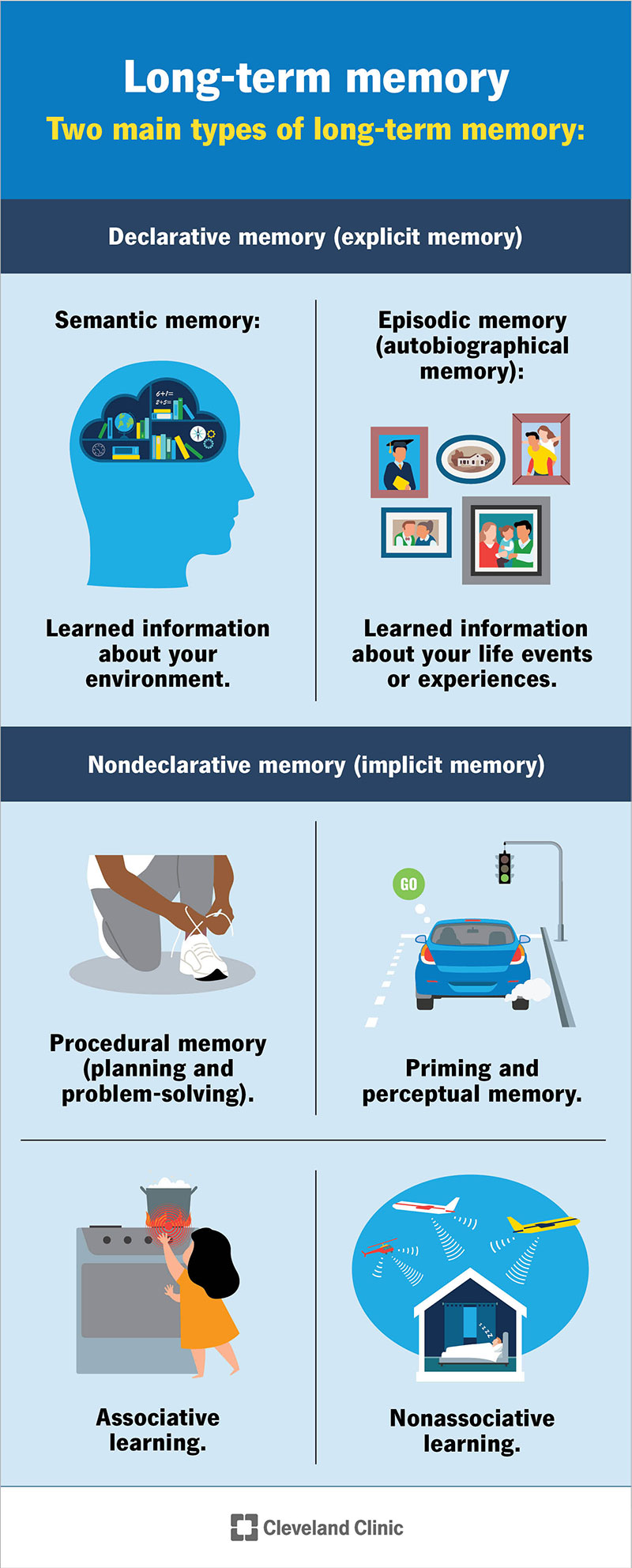Long-term memory is a nearly permanent storage space for learned information and experiences. It can hold memories for years. Long-term memory moves short-term memories to this larger space. Your memories may last a long time, but your ability to retrieve them may be more challenging with age, certain conditions or injuries.
Advertisement
Cleveland Clinic is a non-profit academic medical center. Advertising on our site helps support our mission. We do not endorse non-Cleveland Clinic products or services. Policy

Image content: This image is available to view online.
View image online (https://my.clevelandclinic.org/-/scassets/images/org/health/articles/long-term-memory)
Long-term memory is a nearly permanent storage space to hold experiences and information you’ve learned. There isn’t a limit on how much information you can store in your long-term memory. It can stay in this storage space for years.
Advertisement
Cleveland Clinic is a non-profit academic medical center. Advertising on our site helps support our mission. We do not endorse non-Cleveland Clinic products or services. Policy
The main function of long-term memory is to serve as an archive — to make your short-term memories more permanent. Once your short-term memories move to long-term storage, you can retrieve these memories — like the answer to the trivia question on television, the house number of the street you lived on when you were a kid or what you ate for dinner last night.
There are two main types of long-term memory:
There are two subtypes of declarative memory:
There are four subtypes of nondeclarative memory:
Advertisement
Examples of the subtypes of nondeclarative memory include:
All memories form in your hippocampus, which is in your temporal lobes. There’s a temporal lobe and hippocampus on each side of your head. These parts of your brain sit behind your temples and reach to your ears.
Each type of long-term memory is formed by connecting neurons in various parts of the brain:
There isn’t a specific amount of time that long-term memory can last. In many cases, certain memories can last for years, decades even. You may have memories that last a lifetime.
While the memories themselves can last an unlimited amount of time, your ability to retrieve memories from this storage space may not work as well as it used to as you get older. This can happen due to natural changes that happen with age — your brain activity slows down, so it might take you a little longer to find certain memories within your archives.
Some conditions and traumatic events both physical and psychological can cause memory impairment or long-term memory loss. If you’re having trouble remembering, talk to a healthcare provider.
Your long-term memory is a very important piece of what makes you who you are. You’re able to retrieve information from this part of your brain, often without even thinking about it. It can help you complete routine tasks like brushing your hair or making a cup of coffee in the morning. This database in your brain may make you remember your grandparents’ birthdays, how to ride a bicycle or the capital of the state you live in.
Injuries or conditions that impact your brain may put your long-term memory at risk. As you age, natural changes may affect your ability to retrieve memories. A healthcare provider can help you with any memory concerns you might have.
Advertisement
Advertisement

Sign up for our Health Essentials emails for expert guidance on nutrition, fitness, sleep, skin care and more.
Learn more about the Health Library and our editorial process.
Cleveland Clinic’s health articles are based on evidence-backed information and review by medical professionals to ensure accuracy, reliability and up-to-date clinical standards.
Cleveland Clinic’s health articles are based on evidence-backed information and review by medical professionals to ensure accuracy, reliability and up-to-date clinical standards.
It can be unsettling when your brain stops working like it used to. Cleveland Clinic’s cognitive decline experts help you manage the symptoms and provide support.
